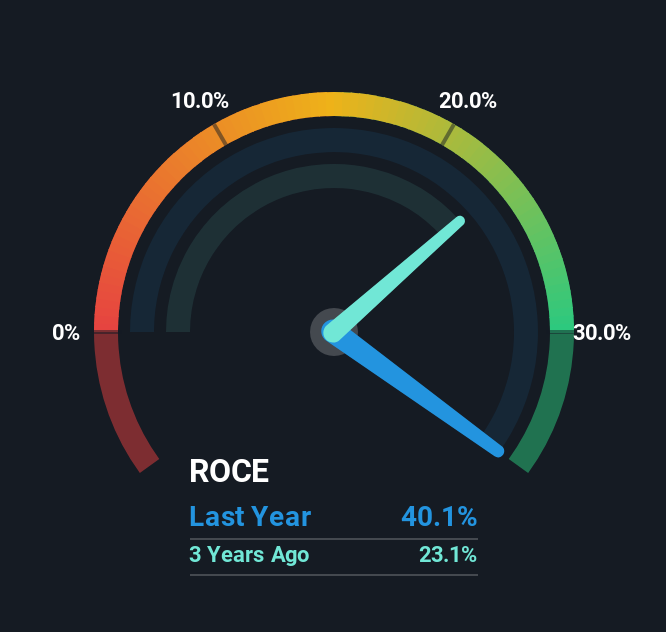- United Kingdom
- /
- Hospitality
- /
- LSE:IHG
Returns On Capital Are A Standout For InterContinental Hotels Group (LON:IHG)
If we want to find a stock that could multiply over the long term, what are the underlying trends we should look for? Firstly, we'll want to see a proven return on capital employed (ROCE) that is increasing, and secondly, an expanding base of capital employed. Ultimately, this demonstrates that it's a business that is reinvesting profits at increasing rates of return. With that in mind, the ROCE of InterContinental Hotels Group (LON:IHG) looks great, so lets see what the trend can tell us.
Understanding Return On Capital Employed (ROCE)
Just to clarify if you're unsure, ROCE is a metric for evaluating how much pre-tax income (in percentage terms) a company earns on the capital invested in its business. To calculate this metric for InterContinental Hotels Group, this is the formula:
Return on Capital Employed = Earnings Before Interest and Tax (EBIT) ÷ (Total Assets - Current Liabilities)
0.40 = US$1.1b ÷ (US$4.9b - US$2.1b) (Based on the trailing twelve months to June 2025).
Thus, InterContinental Hotels Group has an ROCE of 40%. That's a fantastic return and not only that, it outpaces the average of 7.2% earned by companies in a similar industry.
Check out our latest analysis for InterContinental Hotels Group

In the above chart we have measured InterContinental Hotels Group's prior ROCE against its prior performance, but the future is arguably more important. If you'd like, you can check out the forecasts from the analysts covering InterContinental Hotels Group for free.
What Does the ROCE Trend For InterContinental Hotels Group Tell Us?
InterContinental Hotels Group has not disappointed with their ROCE growth. Looking at the data, we can see that even though capital employed in the business has remained relatively flat, the ROCE generated has risen by 169% over the last five years. Basically the business is generating higher returns from the same amount of capital and that is proof that there are improvements in the company's efficiencies. It's worth looking deeper into this though because while it's great that the business is more efficient, it might also mean that going forward the areas to invest internally for the organic growth are lacking.
Another thing to note, InterContinental Hotels Group has a high ratio of current liabilities to total assets of 42%. This can bring about some risks because the company is basically operating with a rather large reliance on its suppliers or other sorts of short-term creditors. Ideally we'd like to see this reduce as that would mean fewer obligations bearing risks.
The Bottom Line
As discussed above, InterContinental Hotels Group appears to be getting more proficient at generating returns since capital employed has remained flat but earnings (before interest and tax) are up. And with the stock having performed exceptionally well over the last five years, these patterns are being accounted for by investors. In light of that, we think it's worth looking further into this stock because if InterContinental Hotels Group can keep these trends up, it could have a bright future ahead.
Since virtually every company faces some risks, it's worth knowing what they are, and we've spotted 3 warning signs for InterContinental Hotels Group (of which 2 are a bit unpleasant!) that you should know about.
High returns are a key ingredient to strong performance, so check out our free list ofstocks earning high returns on equity with solid balance sheets.
New: AI Stock Screener & Alerts
Our new AI Stock Screener scans the market every day to uncover opportunities.
• Dividend Powerhouses (3%+ Yield)
• Undervalued Small Caps with Insider Buying
• High growth Tech and AI Companies
Or build your own from over 50 metrics.
Have feedback on this article? Concerned about the content? Get in touch with us directly. Alternatively, email editorial-team (at) simplywallst.com.
This article by Simply Wall St is general in nature. We provide commentary based on historical data and analyst forecasts only using an unbiased methodology and our articles are not intended to be financial advice. It does not constitute a recommendation to buy or sell any stock, and does not take account of your objectives, or your financial situation. We aim to bring you long-term focused analysis driven by fundamental data. Note that our analysis may not factor in the latest price-sensitive company announcements or qualitative material. Simply Wall St has no position in any stocks mentioned.
About LSE:IHG
InterContinental Hotels Group
Owns, manages, franchises, and leases hotels in the United Kingdom, the United States, and internationally.
Low risk with questionable track record.
Similar Companies
Market Insights
Community Narratives



